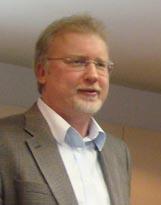
Dr. H. David Schuringa is an ordained minister in the Christian Reformed Church with wide-ranging experience as a pastor, professor and theologian. He is a graduate of Trinity Christian College (B.A.), Westminster Theological Seminary, Philadelphia (M.A.R.; M.Div.), Calvin Theological Seminary (Th.M.) and the Theologische Universiteit te Kampen, The Netherlands (Ph.D.).
Dr. Schuringa served as senior pastor of two established churches in West Michigan and planted a church in Southern California. He taught for nine years at Westminster Seminary California and served as an adjunct professor at Calvin Theological Seminary and Kuyper College in Grand Rapids. He has guest lectured in various seminaries and has served on a variety of boards and committees.
Dr. Schuringa serves on the boards of the Campaign for Justice and Faith Alive Christian Resources. He is a member of the Communities of Faith Advisory Council of the Brennan Center for Justice at the New York University of Law, the Advisory Board of the Institute for Prison Ministry in the Billy Graham Center at Wheaton College and a founding member of the Correctional Ministries and Chaplains Association (CMCA). Dr. Schuringa is also a frequent contributor to the library of the Colson Center for Christian Worldview and a member of its Speakers Bureau.
In 1999 Dr. Schuringa accepted the appointment to head the rapidly growing ministry of CBI. He founded The Center for Advanced Studies at Crossroad Bible Institute (2005) and Crossroad Correctional Services (2010). David travels extensively to speak in churches, schools, prisons as well as at seminars and conferences. He is also the host of the weekly radio program Crossroad Connection, a voice for restorative justice (www.cbi.fm).
Joined by thousands of volunteers, a professional staff and an accomplished Board of Directors, Dr. Schuringa leads the largest personalized follow-up and discipleship ministry of its kind for people in prison and their children.
Posts By This Author
The Unfinished Business of Selma
The journey to end systems of injustice begins with a single step. This theme resonates throughout the recently released film Selma, which recounts the events leading up to the famous Selma-to-Montgomery march. Led by Dr. Martin Luther King Jr., this march catalyzed the full enfranchisement of people of color through the Voting Rights Act of 1965.
The Voting Rights Act is considered to be one of the most successful achievements of the civil rights movement. But 50 years later, the residue of Jim Crow laws that banned people of color from voting lingers today in a new, subtle form: disenfranchisement laws for people with felony convictions.
Michelle Alexander’s book, The New Jim Crow, examines how these laws strip minority communities of their voice in the public sphere because of the disproportionately high percentage of racial minorities “swept into” America’s mass incarceration system.
Should Christians Pray in Public?
Praying out loud had almost become a telltale sign of who was a true Christian and who wasn’t. To this day, I’m not sure (with levity) that you can get served in some parts of Dallas or Grand Rapids if you don’t pray before your meal.
I’ve been pondering this practice for a couple of years now, ever since Tim Tebow’s rise to fame. After touchdowns, he would get down on one knee, bow his head and pray. That gave way to a national phenomenon, “Tebowing,” defined as “to get down on a knee and start praying, even if everyone else around you is doing something completely different.”
Some Christians cheered Tebow for his Tebowing — a bold, fearless demonstration of his faith before millions. He was not ashamed of Jesus. No siree!
On the flip side, some wonder why Peyton Manning doesn’t get with the program, since he also claims to be a Christian. But the superstar Super Bowl quarterback doesn’t feel the need to display his piety. What’s up with that?
Walk a Mile in My Shoes
CNN reports on Usoni , a futuristic television drama produced in Kenya that is about reversed immigration. The show depicts Europe in 2063, where life has turned unlivable after a deadly series of natural and economic disasters.
Europeans are desperately seeking a way to get to a livable continent south of them: Africa. The hardships in making the trip are unfathomable, and once the immigrants arrive, they are unwelcome, harassed, and rejected. The story follows a young couple, Ophelia and Ulysse, who are seeking to make their way with their unborn child to the land of promise.
Yes, the comparisons today to those seeking to immigrate to Europe (with obvious parallels to America) are intentional. Marc Rigaudis, the Kenya-based French filmmaker who created the program, is making a point to help us walk in the shoes of those whom we know the Bible calls “aliens and strangers.”
The chilling trailer depicting people like me being treated as illegal immigrants is enough to make one’s hair stand on end.
America’s Great Divide
When I was invited by the Drug Policy Alliance to participate in a pastors’ conference at the American Baptist College in Nashville on drug decriminalization, I didn’t know quite what to expect. In a room filled with African-American pastors, I felt like a fly on the wall of someone else’s family reunion. I began to see our criminal justice system, and our country, through different eyes.
I’ve reported on the conference elsewhere, but there I learned that while 13 percent of drug users are African-American, they account for 38 percent of drug arrests and 59 percent of drug convictions. Feeling disproportionately targeted, the pastors want drug usage to be treated as a health issue rather than a crime.
As the conference unfolded, it dawned on me that I, as part of the majority culture, perceive law enforcement in ways strikingly different from the way many African-Americans see it. I have always experienced American authorities as my protector. If the police pull me over for speeding, it is nothing more than an annoyance, and the ticket won’t break me. Though I’m no fan of traffic cameras and drones, for the most part the police are there to watch out for me, and they do. It has always been that way for my family, as we can trace our roots of privilege back to Northern Europe in the early 1500s. Those in charge are the good guys who protect us and our stuff.
But for these African-American pastor-friends of mine, it’s a different story.
Traffic Cameras, Domestic Drones, and Mandatory Sentencing
At first I had no problem with domestic drones joining the plethora of surveillance cameras to “keep us safe.”
Big Brother — keeping his eye on me from above in stores, in traffic and everywhere else — would find my personal reality show boring. As a pastor, I’m used to living in a fishbowl. Besides, as John Calvin said, if you fear the eye of a human more than the eye of God, you have spiritual issues to address.
But then, there may be another problem with increased surveillance and flooding our nation’s skies with drones. Let’s take traffic cameras as an example.




